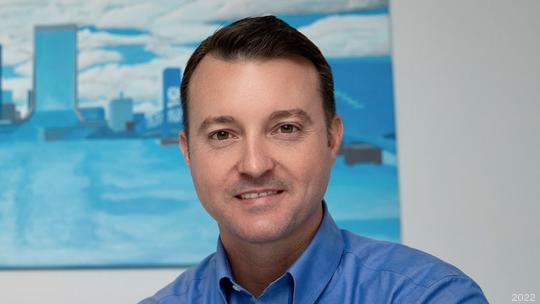
Before founding his own company, Joshua Shuck spent the first 14 years of his career working at Crawford & Co., one of the world’s largest insurance claim management companies. Over his time at Crawford, Shuck assumed the roles of an adjuster, a supervisor, a branch manager, and ultimately a managing director of a program that reported to the U.S. CEO.
He left in 2015 to found Jacksonville-based Straight Line Global, a vendor for insurance companies that operates as an extension of those companies’ claims departments.
With just 12 full-time employees, the company pulls in $5 million to $7 million in annual recurring revenue — depending on hurricane activity — and contracts hundreds of workers across the country.
In December 2020, Shuck received his patent for a general workflow used by Straight Line Global for exchanging media during the claims process.
Shuck left Crawford & Co., he said, because he wanted to focus more on the particular problems he was trying to solve in the insurance space, without facing the constraints faced by those working for a large insurance company. As a vendor for insurance companies, he says much of what he does is develop innovative solutions for insurance companies, which do not themselves face ideal incentives for innovation, and so often look to external entities to exploit the innovation being done in the field.
To get a better sense of the role that smaller companies like Straight Line Global play in the broader insurance space, the Business Journal sat down with Shuck at his Jacksonville headquarters.
You’ve mentioned that there isn’t a lot of innovation taking place within big insurance companies, which leaves a gap that start-ups interested in innovating in that space can fill. Why aren’t big insurance companies innovating?
It’s not that all parts of insurance are not innovating. It’s that [the typical insurance company is] a big company. We’re talking about tens or hundreds of millions of dollars that are wrapped up in an insurance company because there’s so much capital movement through there. So, there’s a lot of incentive to protect that and not risk a company that’s already juggling risk.
Insurance companies are regulated by the state, they’re rated by rating agencies, and they’re at the mercy of the reinsurer. So, they’ve got people all around them that are challenging their decisions, that are constraining them in some way. There’s a lot of pressure on an insurance company to act in a particular way.
Over the last couple years, though, we have seen innovation in the way you buy insurance, there’s been innovation in underwriting — in the way that they categorize you, they’ll do a web scrape of you to look for who you are as a person — and now there’s more innovation in the claims process, which is the part of the insurance I sit in.
How does a vendor like Straight Line Global exploit insurance companies’ incentive to avoid risk, and interest in innovative products?
Part of the value-add for Straight Line Global is that, as a vendor, as a service provider, we have more autonomy, and we can be innovative and forward-thinking without the insurance company themselves needing to take that risk. I think a lot of what insurance companies are doing now to stretch innovation is to partner with vendors who are willing to stretch, so [the insurance company] can still be risk-averse, can have some independence from that and not put all of their corporate energy into a start-up or a new underwriting process, but allow vendors to come through and say, “We’ve got a new idea that we’re working on.”
They can try it, they can use it, but still have that core of security. So, they’re not risking at all to engage with a forward-thinking vendor.
When you left Crawford, was there a particular problem within insurance you were trying to solve that you felt you could do a better job solving by starting your own company than by staying?
Utilizing mobile technology was the problem that I knew that I could fix if I was not bound by any legacy system. If I wasn’t trapped by a corporate infrastructure that demanded a process, I knew that we could do it better, relying on mobile technology.
Again, remember, this is seven, eight years ago, so today, it almost sounds silly, but eight years ago, it was on the front side of what we were doing.
I was always, a little bit, pushing the envelope. I always wanted to do things a little bit faster, a little bit quicker. I’ve always been much more focused on outcomes than the path to get there.



